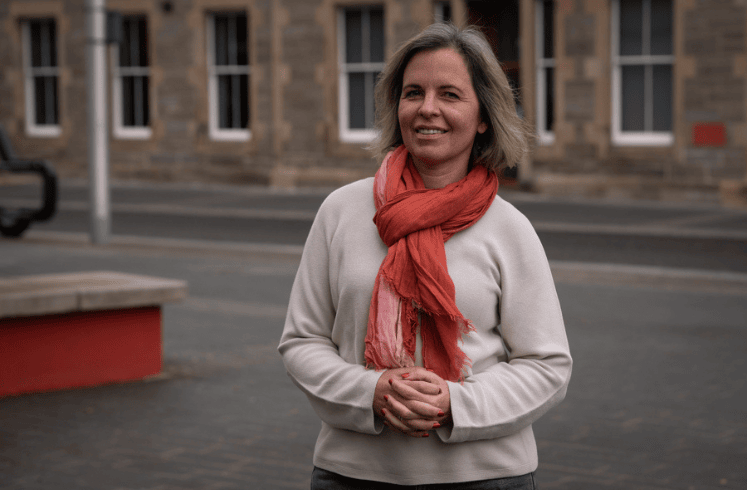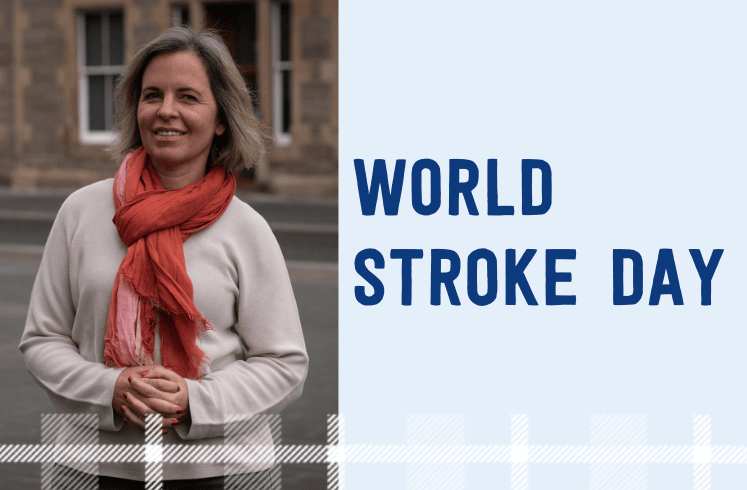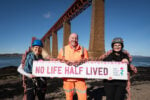Chest Heart & Stroke Scotland is calling for better access to mental health support services for stroke patients
Half of all stroke survivors go home worrying that they will have another stroke in the future and report that mental health issues are one of the biggest challenges they face in recovery.
New research from Chest Heart & Stroke Scotland (CHSS) released ahead of World Stroke Day on Sunday 29 October, paints a concerning picture of life for the over 11,000 Scots a year who have a stroke.
Two in five (41%) stroke survivors said their condition is affecting their mental health, with people saying it impacted on their self-confidence, self-esteem and caused them anxiety and stress.
Some stroke survivors are leaving hospital scared and alone with an uncertain future ahead of them. They need help and support to get their lives back on track, but sadly they are really struggling to access services.
The research came from a major survey of more than 1000 stroke survivors in Scotland carried out by CHSS this summer.
However, the survey also revealed that those receiving support from CHSS reported their health and well-being higher than those who had not received support from the charity.
Jane-Claire Judson, chief executive of Chest Heart & Stroke Scotland, said: “Stroke is one of the biggest causes of adult disability in Scotland and half of all stroke survivors in our recent survey (49%) told us their biggest fear was having another stroke.
“Some stroke survivors are leaving hospital scared and alone with an uncertain future ahead of them. They need help and support to get their lives back on track, but sadly they are really struggling to access services.”
Better access to mental health services
Half of stroke survivors (52%) say they are struggling with fatigue or sleep problems, and more than half (56%) said it affected their ability to be physically active.
Many people have difficulty getting back into work, to enjoy hobbies, and be independent, with their condition leading to feelings of isolation and loneliness.
CHSS is calling for better access to mental health services for people who have had a stroke. It says the Scottish Government, NHS Scotland and local authorities must ensure there is enough psychological support to meet demand.
Jane-Claire Judson continued: “Our research shows that accessing support from CHSS makes a positive difference to the lives of people post-stroke, but we need the Scottish Government and the NHS to ensure that additional support is available.
“Stroke survivors must be able to access appropriate psychological and emotional support at the time they need it, as outlined in the Scottish Government’s Stroke Improvement Plan.”
Esther’s story
Esther Stielow had a stroke aged just 50 in February 2021.

Esther Stielow had a stroke aged just 50 in February 2021.
The mum of two, who lives in Clunie, Perthshire said the stroke has affected the movement in her right hand and also left her with aphasia, a communication disorder affecting speech and language.
Esther said: “Everything changed in my life from that moment. Physically I am still affected – I often feel fatigued later in the day, and I feel anxious and depressed at times.
“I had to have brain surgery that caused me to develop epilepsy. That meant I lost my driving licence, too.”
Esther, who is originally from Germany and has lived in Scotland for 26 years, collapsed while out with a friend. She was rushed to Dundee’s Ninewells Hospital where she had emergency surgery. She spent two months in hospital recovering, first at Ninewells and then at the city’s Royal Victoria Hospital.
“The scariest time for everyone is when you are leaving hospital because you don’t know what’s coming next. I was fortunate that Hazel from Chest Heart & Stroke Scotland got in touch with me as soon as I got home, so I never felt alone. I felt supported from the start.”
“My recovery is a work in progress”
Two years later, Esther is doing a lot better, she has got her driving licence back and is able to work a few days a week in her family’s mobile pizza van.
She said: “I’m fortunate that I work in the family business. I have been able to return to working a couple of days a week, and that is important for me. I feel I am still contributing but I am not under pressure.
“My recovery is a work in progress. I still struggle with my words and my writing. I can just about manage a shopping list, but I am not writing in sentences. I’m a member of the CHSS group that meets in Perth theatre every Tuesday.
“We do writing and speaking exercises, and I even get homework to do! But it’s fun and giving me confidence that I wouldn’t have otherwise. That is what is so good about CHSS – they make me feel safe and cared for.
“I also joined the new Perth walking group on Thursdays with CHSS. It’s lovely to be in the company of people who have had a similar experience. Sometimes there are a few tears because things can be tough when you’re recovering, but mostly we laugh and enjoy the exercise and being with each other.”
Find out more about our Services and Support.








